| Listing 1 - 10 of 19 | << page >> |
Sort by
|
Book
ISBN: 9781594202285 Year: 2009 Publisher: New York (N.Y.) : Penguin press,
Abstract | Keywords | Export | Availability | Bookmark
 Loading...
Loading...Choose an application
- Reference Manager
- EndNote
- RefWorks (Direct export to RefWorks)
Draws on a broad range of scientific evidence to theorize an evolutionary basis for religion, considering how religion may have served as an essential component of early society survival and that the brain may be inherently inclined toward religious behavior.
Sociology of religion --- Religion --- Philosophy.
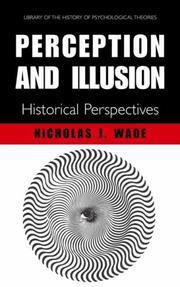
ISBN: 1280413336 9786610413331 0387227237 0387227229 1441935576 Year: 2005 Publisher: New York Springer
Abstract | Keywords | Export | Availability | Bookmark
 Loading...
Loading...Choose an application
- Reference Manager
- EndNote
- RefWorks (Direct export to RefWorks)
The understanding of perception is central to our knowledge of the mind. Yet paradoxically, this understanding was born of centuries of fascination with errors of human perception. Perception and Illusion: Historical Perspectives elegantly retraces this scientific journey, not only in terms of its trials and errors but in its complex relationships with painting and medicine, philosophy and physics. In this accessible volume, Nicholas Wade surveys over two millennia of scientific inquiry and research, describing the evolution of theories of light, sight, and illusion from early naturalistic observation to our sophisticated present-day experiments. Optics, physiology, and ophthalmology are seen emerging from beneath the burden of tradition and dogma. So, too, do doctors and thinkers studying the senses become practitioners devoted to specialized domains. • The Greek foundations of perception: Plato, Aristotle, Euclid, Ptolemy • Art and perception before and after the Renaissance: color mixing and linear perspective • The seventeenth and eighteenth centuries: ocular anatomy meets optical science; the separation of sight from light • Perception and behavior: illusions and the roots of psychology in the nineteenth century; the fragmentation of the senses; harnessing space and time • Perceptual innovations in the twentieth century: from infant vision through visual physiology to virtual reality. Perception and Illusion: Historical Perspectives is illuminating reading for students of the history of psychology, optics, and medicine, and provides insights into the history and progress of science. In addition to charting these visual milestones, Wade reminds the reader in an articulate manner of perceptual controversies—including some of the most basic ones—that have yet to be resolved.
Visual perception. --- Vision --- History. --- Eyesight --- Seeing --- Sight --- Senses and sensation --- Blindfolds --- Eye --- Physiological optics --- Optics, Psychological --- Perception --- Visual discrimination --- Psychological aspects --- History of civilization --- Affective and dynamic functions --- Psychology --- Psychology, clinical. --- History of Psychology. --- Clinical Psychology. --- Clinical psychology. --- Psychiatry --- Psychology, Applied --- Psychological tests --- Visual perception --- History --- Psychology. --- Behavioral sciences --- Mental philosophy --- Mind --- Science, Mental --- Human biology --- Philosophy --- Soul --- Mental health
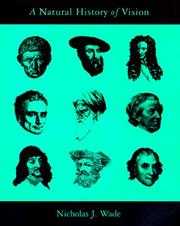
ISBN: 0262231948 0262731290 Year: 1998 Publisher: Cambridge (Mass.) : MIT press,
Abstract | Keywords | Export | Availability | Bookmark
 Loading...
Loading...Choose an application
- Reference Manager
- EndNote
- RefWorks (Direct export to RefWorks)
Vision --- Physiological optics --- Visual Perception --- Optique physiologique --- History --- physiology --- Histoire --- -Vision --- -Eyesight --- Seeing --- Sight --- Senses and sensation --- Blindfolds --- Eye --- Optics, Physiological --- Optics --- History. --- physiology. --- -History --- Vision, Ocular --- Physiological optics - History. --- Eyesight
Book
ISBN: 0802705723 Year: 1977 Publisher: New York (N.Y.) : Walker,
Abstract | Keywords | Export | Availability | Bookmark
 Loading...
Loading...Choose an application
- Reference Manager
- EndNote
- RefWorks (Direct export to RefWorks)
241.63*2 --- Genetic engineering --- -Designed genetic change --- Engineering, Genetic --- Gene splicing --- Genetic intervention --- Genetic surgery --- Genetic recombination --- Biotechnology --- Transgenic organisms --- Theologische ethiek: medische ethiek: dokter; verpleegster; ziekenhuis --- Social aspects --- Social aspects. --- -Theologische ethiek: medische ethiek: dokter; verpleegster; ziekenhuis --- 241.63*2 Theologische ethiek: medische ethiek: dokter; verpleegster; ziekenhuis --- -241.63*2 Theologische ethiek: medische ethiek: dokter; verpleegster; ziekenhuis --- Designed genetic change
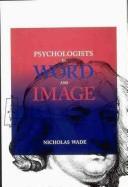
ISBN: 0262731126 0262231808 Year: 1995 Publisher: Cambridge (MA) : M.I.T. Press,
Abstract | Keywords | Export | Availability | Bookmark
 Loading...
Loading...Choose an application
- Reference Manager
- EndNote
- RefWorks (Direct export to RefWorks)
We are all fascinated by physiognomy, intrigued by the appearance of the people we admire. These perceptual portraits of more than 100 thinkers who have fashioned our understanding of mind and behavior provide an alternative view of the history of psychology that is both pleasing and puzzling.Francis Bacon, René Descartes, Pierre Broca, Sigmund Freud, Carl Jung, Ruth Benedict, Allen Newell, David Marr and scores of others whose ideas have made psychology an empirical discipline emerge from motifs specifically drawn by the author or derived from a figure or text in one of the portrayed person's books, or an apparatus he or she invented. The ingenious treatment of portrait/motifs often challenges the viewer to discern the faces embedded in them and always tells us more than how these students of mind looked: these portraits reflect their thoughts and lead us to forage further into their lives and legacies.The portraits and motifs have been manipulated in a variety of ways, using graphic and photographic procedures. They are arranged in order of birth date in a format of one page of descriptive text facing a full-page perceptual portrait. The text presents a brief synopsis of the person portrayed, that person's ideas, and the source of both the portrait and the motif. Interrelations between people are stressed, bringing to light common threads that run through the work of particular groups and adding yet another level to this unique gallery of psychology's pioneers.
Psychology --- History
Book
ISBN: 0710008686 Year: 1982 Publisher: London : Routledge and Kegan Paul,
Abstract | Keywords | Export | Availability | Bookmark
 Loading...
Loading...Choose an application
- Reference Manager
- EndNote
- RefWorks (Direct export to RefWorks)
159.931 --- 612.843.7 --- Optical illusions --- #SBIB:309H526 --- Illusions, Optical --- Hallucinations and illusions --- Physiological optics --- Visual perception --- Zien. --- Visual perception. Spatial vision. Binocular vision. Stereoscopy --- Psychologie van de audiovisuele boodschap --- Optical illusions. --- 612.843.7 Visual perception. Spatial vision. Binocular vision. Stereoscopy --- 159.931 Zien. --- Zien
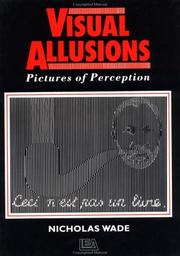
ISBN: 0863771300 Year: 1990 Publisher: Hove (Sussex) : Erlbaum, Lawrence, Associates,
Abstract | Keywords | Export | Availability | Bookmark
 Loading...
Loading...Choose an application
- Reference Manager
- EndNote
- RefWorks (Direct export to RefWorks)
Physiology of nerves and sense organs --- visual perception --- Sociology --- perception --- optical illusion --- Psychology --- #SBIB:309H526 --- Psychologie van de audiovisuele boodschap
Multi
ISBN: 9780387227238 Year: 2005 Publisher: Boston, MA Springer Science + Business Media, Inc
Abstract | Keywords | Export | Availability | Bookmark
 Loading...
Loading...Choose an application
- Reference Manager
- EndNote
- RefWorks (Direct export to RefWorks)
The understanding of perception is central to our knowledge of the mind. Yet paradoxically, this understanding was born of centuries of fascination with errors of human perception. Perception and Illusion: Historical Perspectives elegantly retraces this scientific journey, not only in terms of its trials and errors but in its complex relationships with painting and medicine, philosophy and physics. In this accessible volume, Nicholas Wade surveys over two millennia of scientific inquiry and research, describing the evolution of theories of light, sight, and illusion from early naturalistic observation to our sophisticated present-day experiments. Optics, physiology, and ophthalmology are seen emerging from beneath the burden of tradition and dogma. So, too, do doctors and thinkers studying the senses become practitioners devoted to specialized domains. ¢ The Greek foundations of perception: Plato, Aristotle, Euclid, Ptolemy ¢ Art and perception before and after the Renaissance: color mixing and linear perspective ¢ The seventeenth and eighteenth centuries: ocular anatomy meets optical science; the separation of sight from light ¢ Perception and behavior: illusions and the roots of psychology in the nineteenth century; the fragmentation of the senses; harnessing space and time ¢ Perceptual innovations in the twentieth century: from infant vision through visual physiology to virtual reality. Perception and Illusion: Historical Perspectives is illuminating reading for students of the history of psychology, optics, and medicine, and provides insights into the history and progress of science. In addition to charting these visual milestones, Wade reminds the reader in an articulate manner of perceptual controversies including some of the most basic ones that have yet to be resolved.
Psychology --- Psychiatry --- psychologie --- geschiedenis --- klinische psychologie
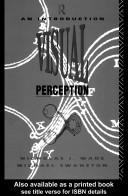
ISBN: 041501042X 9780415010429 9780415010436 0415010438 Year: 1991 Volume: vol *2 Publisher: London New York, NY Routledge
Abstract | Keywords | Export | Availability | Bookmark
 Loading...
Loading...Choose an application
- Reference Manager
- EndNote
- RefWorks (Direct export to RefWorks)
Discrimination visuelle --- Motion perception (Vision) --- Optics [Psychological ] --- Perceptie [Visuele ] --- Perception [Visual ] --- Perception visuelle --- Perception visuelle du mouvement --- Vision--Psychological aspects --- Visual discrimination --- Visual perception --- Visuele discriminatie --- Visuele perceptie --- Visuele waarneming --- Visuele waarneming van de beweging --- Waarneming [Visuele ] --- Discrimination (Psychology) --- Visual Perception. --- Percepcao (psicologia) --- Perception visuelle. --- Discrimination visuelle. --- Perception visuelle du mouvement. --- Vision --- Visuele waarneming. --- Visual perception. --- Visuelle Wahrnehmung. --- Histoire. --- Discrimination (Psychology). --- Percepcao (psicologia). --- Affective and dynamic functions --- History --- Visual discrimination. --- Vision - History.

ISBN: 0203133250 9780203133255 041501042X 0415010438 9780415010429 9780415010436 1280328118 Year: 1991 Publisher: [Place of publication not identified] Routledge
Abstract | Keywords | Export | Availability | Bookmark
 Loading...
Loading...Choose an application
- Reference Manager
- EndNote
- RefWorks (Direct export to RefWorks)
Vision is our most dominant sense, from which we derive most of our information about the world. From the light that enters the eye and the processing in the brain that follows, we can sense where things are, how they move and what they are. The first edition of Visual Perception took a refreshingly different approach, to perception, starting from the function that vision serves for an active observer in a three-dimensional environment. In this second edition Nicholas Wade and Michael Swanston have continued this approach in contrast to many traditional textbook treatments of vision as a catalogue of phenomena. The core of the book covers the perception of location, motion and object recognition. The machinery of vision is also described. The book places the study of vision in its historical context as our ideas have been shaped by art, optics, biology and philosophy as well as psychology. The authors have again provided a readable, accessible and truly relevant introduction to the world of perception that will be welcomed by students studying visual perception and those with a general interest.
Visual perception --- Visual discrimination --- Motion perception (Vision) --- Vision --- Discrimination, Psychological. --- Visual Perception. --- Visual Processing --- Perception, Visual --- Processing, Visual --- Vision, Ocular --- Discrimination, Psychology --- Psychological Discrimination --- Eyesight --- Seeing --- Sight --- Senses and sensation --- Blindfolds --- Eye --- Physiological optics --- Movement perception (Vision) --- Speed perception --- Movement, Psychology of --- Sensory discrimination --- Optics, Psychological --- Perception --- History --- Psychological aspects --- History.
| Listing 1 - 10 of 19 | << page >> |
Sort by
|

 Search
Search Feedback
Feedback About UniCat
About UniCat  Help
Help News
News